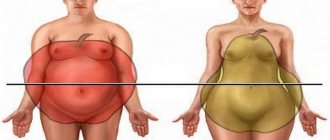In the modern world, excess weight has ceased to be a problem for an individual person. There has been talk for a long time about the problem of obesity in the United States. This is a global problem. And not only Americans, but the whole world. How to get rid of excess weight - not only ordinary people, but also scientists from all over the world are looking for the answer to this question. Solving the problem of “how to lose weight” is a difficult process that relies on strong willpower, the ability to endure and the desire to change.
How to lose weight when the scale dial shows more than one hundred and fifty kilograms? Now there are more and more people with this and even greater weight. People whose weight fluctuates around one hundred fifteen to one hundred and twenty kilograms do not often ask themselves the question: how can you lose weight? They do not yet see the acute problem that originates anywhere, but in their own body. Solving the problem of “how to lose weight” does not torment your mind every day. It always seems that tomorrow I’ll start running, watch a CD with fitness exercises that I bought six months ago and repeat them in front of the TV, and everything will pass. What then you won’t have to ask - how to lose weight quickly? After all, you know the answer to it, and the problem is about to disappear. But the days go by, the sneakers gather dust in the shoe drawer, and the fitness CD lies right next to your favorite melodrama or psychological thriller.
And the weight is growing. And there is no longer that lightness that was not long ago. Now the climb to the second floor no longer seems so short. After all, the problem of “how to lose weight” affects the entire body. This is not only a problem with the outer shell. Health is deteriorating. Shortness of breath has already appeared, the joints on the legs hurt, and after sudden movements the whole world treacherously floats in the eyes.
How can you lose weight? How to lose weight quickly? How to lose weight in a month? How to lose weight in a week? Is it possible to lose weight at all? These questions should never be put off even at the beginning of the problem of excess weight. Can't launch. After all, after a certain limit, jumping rope, spinning a hoop, and bending will become not an easy evening or morning exercise, but a huge amount of work.
How to get rid of excess weight? The main thing is to recognize the problem. Don't be ashamed of yourself and your own figure. You should be proud of yourself. After all, you don’t give up, your eyes burn with the desire to conquer everything – physiology, your own body. And if the struggle has begun, the problem of excess weight will recede. The main thing is to fight for yourself and for your happiness. You shouldn’t say: “How to lose weight? How to lose weight? I have ways to lose weight - I’ll start on Monday.” You can't put it off until tomorrow. Get started today! Now!
And you don’t need much at all - willpower, patience and the desire for the final goal. After all, a good figure and the health of your own body are ahead. Let's start the fight. Let's stock up on a notebook for notes, a centimeter (soon it will make us happy), kitchen and floor scales and a pedometer. In order to lose weight you need to follow a number of rules.
Rule #1. Our weight is the body’s own reaction to the way we eat. For health it should be dosed and regular. After all, if you stop eating, your health will not increase. Everyday life requires all the forces hidden in our body. Therefore, you should not lose them. You need to eat at least five times a day. Food must be consumed regularly every day, so you need to think about convenient eating hours and follow this schedule. The time between meals should not exceed four hours. Portions should be less than three hundred grams. After all, we answer the question: “How to lose weight?”, and not vice versa. Weigh each dish (that's what kitchen scales are for) - this will help you avoid mistakes.
The first month is the most difficult in the difficult battle with excess weight. It is necessary to strictly follow the meal schedule. Wait patiently for the scheduled time to eat. But you shouldn’t starve yourself either. The main thing is that the daily intake of food does not exceed one and a half kilograms. This is quite enough for the proper and healthy functioning of the body.
Rule #2. You need to think about what you eat. Harmful foods should be excluded from the diet. But this must be done gradually. Every month you need to give up three harmful foods. In the first month, you can exclude fast food, confectionery and mayonnaise.
Rule #3. While we are moving, we are living. Therefore, in the fight against excess weight, you cannot give up activity. Of course, it’s not right to start running marathons or jumping rope like a child. Moreover, at first the main enemy will interfere - excess weight. Let's start with walking. And the controller will be the pedometer. Most often, an overweight person takes a thousand steps a day. This figure needs to be increased tenfold. At the end of the day, the pedometer should show at least ten thousand steps. I can do it. The main thing is not to rush straight into the pool. The step load must be increased gradually. Let's just do without heroism. Only a reasonable approach will help achieve the desired result. And after some time, to the great joy of the native body, the ability to run and jump will return.
Rule #4. Keep a diary (the notebook you have saved is useful for this). It is necessary to record indicators in it: how much is eaten per day, how many steps are taken, body volume and weight, and one’s own well-being. All indicators must be entered into the diary daily. Only volume and weight need to be noted once a month. The diary is a controller and assistant in the fight against excess weight.
These rules are very effective in the battle against excess weight. To improve results, you can resort to medications. The main thing is to make sure that there are no contraindications.
Meridia (Sibutramine) is one of the drugs for combating excess weight. This drug reduces appetite, which promotes weight loss. The main thing to remember is that, like all medications, it has side effects and contraindications for use. Before use, you must carefully read the instructions and consult a doctor. Meridia (Sibutramine) is strictly contraindicated in people with high blood pressure (exceeding 145/90 mm Hg), coronary heart disease, heart disease or chronic heart failure.
If your doctor has approved you to take this drug, you can start taking it 10 mg every day in the morning. If no significant effect is observed within four weeks, the dosage can be increased. The drug is taken for one year under the supervision of a doctor.
There are different ways to lose weight. Is it possible to lose weight? How to get rid of excess weight? How to lose weight quickly? It is important that these questions are raised. And the answer to them can always be found. And immediately begin to act. After all, excess weight cannot be compared with rain, which will end anyway. If you do nothing, the problem will not disappear, but will only get worse. Take action!
Have a healthy and fulfilling life ahead!
Three types of hunger
1. Physiological hunger. This is when a person just wants to eat and is ready to eat anything. He doesn't really delve into the menu and doesn't really want to understand the ingredients of the dish. He just wants to eat and does it.
Or he “digs” into the menu, but without much enthusiasm and scrupulousness; here it is more important to get a portion of “fuel” for the body and “go” further through the events of your life.
In this case, a person gets full at the “call” of his body and forgets about food until the next “call”. Here he rarely overeats and food serves as a kind of “fuel” for the body’s life support. In a word, a person clearly “hears” and feels the needs of his body.
2. Psychological hunger. This is when a person is full, but at the sight of a set table he wants to eat something else. Such “digging” in one’s desires begins according to the principle: “I want something like this, that...”.
Such a person can often open the refrigerator and look... At the same time, thoughts like this will be spinning in his head: - What if I finally find something tasty! And if he finds this “delicious” thing, he will start eating even on a full stomach. This is already called uncontrolled overeating, which is fraught with the onset of obesity.
3. Hunger occurs due to a lack of some microelement. A person cannot understand what exactly he needs, and “sweeps away” everything indiscriminately in search of “the one.” Here they can start with something sweet, for example, tea with jam, and end with soup or a second dish. And from the outside it seems that a person does not have an elementary culture in food, although this condition can already be called clinical.
What should you do in this case? Take this person’s hair and submit it for analysis to a special laboratory, where they will assess the amount of microelements in the body and identify imbalances.
Such laboratories already exist in Moscow and St. Petersburg. And based on the results, the specialist will develop a special menu with recommendations. Possibly, bads will be connected. As practice shows, for a good, lasting result it takes months, six months or more.
Often this type of hunger can be observed in children and adolescents, as their body is growing rapidly and does not have time to compensate for all the necessary needs. microelements. In this case, it is better to wait; there is a high probability that the body will cope on its own. You just need a variety of food on the table.
Restriction does not mean deprivation, simple rules.
In practice, eating according to your circadian rhythm is not particularly difficult:
- Consume most carbohydrates before 3 pm, when your body is most efficient at burning glucose.
- At the end of the day and beginning of the evening, focus on proteins, cruciferous and leafy vegetables, and healthy fats.
- Pay attention to the time you start your first meal (yes, coffee with milk and/or sweetener counts) and then the time of your last meal, so that you finish eating within 12 hours. For example, if you have breakfast at 7 am, finish dinner by 7 pm.
If you eat your last meal a little later than you'd like, Pamela M. Peek suggests delaying your breakfast until the next morning to ensure an adequate period without eating. Also, in order to lose excess weight, reduce your daily calorie intake. Following these simple rules will help you achieve your desired results.
Food culture
If we look around, we see people chewing everywhere. On the street, while driving a car, in the cinema, watching TV, at the computer, etc. We ourselves often eat with company, without always feeling hungry. We eat out of grief, we eat out of joy, we eat to “kill” time.
A real cult of food appears in our lives, not its culture. Just as an alcoholic goes on a “binge,” we can often go on “binges,” and then we ask ourselves the eternal question: “How to lose weight, and, moreover, correctly, so that in a month, the other weight does not return in the same amount.”
Taste is formed just like any other habit. Taste for food, including. Of course, this is all laid down from childhood and passed on as a value from generation to generation. Why is it so important to set the tables (at least sometimes) and have family breakfasts, lunches, and dinners. Children see this and copy this model of parental behavior in their later lives.
Basic Rule
Extra kilos do not accumulate in a couple of days - you increased in volume day after day: every cake and candy made its contribution. And when it got warm outside, you discovered that half of your things no longer fit on you. Therefore, remember: no one can get rid of accumulated centimeters with lightning speed.
Strict diets are taboo because they almost always lead to the opposite result - you become overweight. In addition, they imply the rejection of many foods vital for the body.
What causes excess weight?
Because they eat a lot of the wrong foods. Of course, we do not take into account those cases where there are serious hormonal imbalances. Although here, too, fat is deposited not from the air, but from the food eaten.
Nutritionists from different countries agree that adipose tissue begins to increase very strongly when they eat incompatible foods. This is especially true for the simultaneous consumption of carbohydrates and fats. Hence the conclusion that all sandwiches with butter and cheese are just the bomb!
What products cannot be combined?
All products that contain carbohydrates and fast sugars cannot be consumed with fats. From this it turns out that fatty meat and other fatty foods should not be eaten with bread and, for example, mashed potatoes or pasta. And our whole idea of healthy and proper food is turned upside down.
Although since childhood we have been accustomed to cutlets with mashed potatoes and rich, fatty cabbage soup with a piece of bread. And the saying: “You can’t spoil porridge with butter” is losing its relevance today.
Hypoglycemia and the problem of excess weight
Eating a high-carbohydrate diet causes the body to become accustomed to overproducing insulin. An increase in blood sugar causes the pancreas to release large amounts of insulin. This should lower blood glucose levels and move that sugar into the body's cells. Overproduction of insulin becomes a constant process over time, and even eating a meal containing a small amount of carbohydrates leads to the usual, large release into the blood.
Symptoms of this include large fluctuations in blood sugar levels. Overproduction of insulin too quickly removes glucose from the blood, which is a natural source of energy and acts as a driving force.
Hypoglycemia is very common these days. You feel suddenly tired and sluggish during the day, this is due to a decrease in blood glucose levels. Eating a “bad carbohydrate” very quickly restores the imbalance, causing an immediate improvement in well-being and increased energy. Unfortunately, the excess insulin produced causes glucose levels to drop even faster, and we fall into a vicious cycle of eating and eating more and more.
Symptoms of hypoglycemia are as follows:
- Sudden onset of fatigue for no particular reason
- Nervousness and hyperactivity
- Aggressiveness, impatience, severe anxiety
- Yawning and lack of concentration
- Headache
- Excessive sweating, wet hands
- Reluctance to work and especially mental effort
- Digestive disorders, flatulence, nausea, dizziness
- Difficulty concentrating
Rules and little tricks for losing weight
There are a number of rules that allow you to look at food more consciously and meaningfully. And by doing at least some of them, the amount you eat can be reduced. This means that the body will feel better in the literal sense of the word. So how to lose weight?
1. Loud noises suppress our conscious attitude towards food. TV, music and other noises distort the correct perception of food and make it difficult to concentrate on your meal. When we hear our own chewing sound, we pay attention to what we are chewing and make some kind of assessment, analysis, is it worth taking another piece/portion?
There are even restaurants where the music is turned off for a while and the room is immersed in its own sounds. People begin to hear their crunching and chewing and become more aware of what and how much they eat.
No matter how strange it may sound, the sounds of chewing food well “saturate” the brain and it sends appropriate signals to the body. Therefore, crunching and chewing sounds at the table are not just normal, they are correct. Although we are all taught from childhood to eat silently.
2. Chaos and confusion also negatively affect the amount of food eaten. When a person sits down at an uncleaned table, his assessment of what he has eaten seems to “dissolve” in this mess.
Or when a person is endlessly distracted by phone calls, or often gets up from the table for some business. There’s nothing to even say about eating on the go – it’s just disrespect for your health.
3. We often “eat” with our eyes. Sometimes we don’t estimate the size of the plate, but our habit of finishing our food to the end often leads to overeating. In this case, the eyes ignore the brain's signals about oversaturation. Although large plates are beautiful and presentable, they are still best used for holidays.
In large plates, a large portion looks smaller than it actually is, and subconsciously a person reaches out to eat more. If you reduce the diameter of the plate by 5 cm, then you will eat 20% less (an experiment was conducted and this has scientific confirmation).
4. There is one more recommendation, it concerns the color of the plates. Dark food should be placed on a white plate, and light food should be placed on a dark plate. A portion of food is perceived more correctly.
There is also one nuance with the shapes of glasses and glasses. Taller forms make it seem like there is more liquid in them, although this is not the case. Therefore, give preference to tall glasses and glasses. Subconsciously, you will get satiated from them faster.
It is important to listen to your body and not follow your eyes.
5. To turn off the food “autopilot,” nutritionists advise eating with a hand other than your “working” hand. For example, a left-handed person should hold a spoon with his right hand and vice versa. Until the non-working hand with a fork or spoon manages to catch something, a person will think several times about what he is eating and how much.
Or another technique: Take a piece of food into your mouth and chew, and at this time put the cutlery on the table, freeing your hands. We finished chewing, picked up cutlery again, etc.
6. Make it a habit to cut your food into small pieces. This also contributes to longer chewing of food and a person gets full faster.
7. When you want something sweet, you need to urgently go brush your teeth. The fresh taste of toothpaste “turns off” this desire.
8. A mirror is good for reducing appetite. It has been noticed that if you sit in front of a mirror and eat, the portion of what you eat will be smaller. Therefore, it makes sense to place a mirror in front of the table in the area where you eat.
9. Experts do not recommend taking long breaks from eating, since being very hungry, a person cannot cope with brain signals and will definitely eat something that is fatter, higher in calories and more. This happens on an unconscious level. And if we constantly “turn on” our mind and logic at these moments, then we will get nothing but irritation and a bad mood. As they say, you can't fool nature.
And, of course, you need to be more active, stand on your feet more, and not look for places to sit. Avoid all sitting on benches, move and walk more.
Some facts and myths
These days, due to media persecution, some "fat theories"? they are so absorbed in the universal consciousness that it is often impossible to convince people that they are just myths.
- Myth: The only cause of obesity is excess fatty foods.
- Myth: You need to eat a lot of carbohydrates to avoid gaining weight.
- Myth – Counting the number of calories we consume throughout the day and limiting them will prevent us from gaining excess weight.
- Myth – Cholesterol is a determining factor in our health, so you should constantly monitor its concentration in the blood and reduce it if necessary.
Yes, yes, these are just myths. The facts tell a different story:
- A food intake of, for example, 1500 calories per day is always theoretical.
- Tables in many reference books contain different kilocalorie values for the same foods.
- Their energy value varies significantly depending on whether we consume them raw or after cooking, with or without fat.
- The proportion of fat in relation to protein and carbohydrates in consumed meat depends on the method of raising the animal, culinary processing and its preparation.
- Theoretical caloric calculations never take into account the conditions for absorption of fats and carbohydrates in the small intestine, which vary depending on whether plant fiber is present in the diet, since a significant increase in fiber can significantly reduce the number of calories absorbed.
- The amount of protein, fat and carbohydrate absorption varies depending on the time of day and the chemical environment of the stomach and small intestine, that is, the conditions under which food is digested.
Theorists don't take this into account!
There are often overweight people who become even fatter while on a weight loss diet. In fact, the body, which defends against weight loss, despite a depleted diet, accumulates much more fat than before the weight loss process began. This is its primitive form of self-defense against weight loss and possible death associated with nutritional deficiencies.
In the initial period, a significant decrease in body weight occurs, then its further decrease stops. A person who has lost weight and is so pleased with the result believes that the weight will remain unchanged, unfortunately, this is not the case. After a period of suffering and sacrifice, there comes a phase of self-confidence that eating a few cookies or a few bars will not change anything, will not increase the set weight. Later? They convince themselves that nothing happened after eating sweets, which means they can eat a few pieces of delicious cake... and so on.
In the short term, there is rapid weight gain despite continuing a low-calorie diet.
Discouraged by this phenomenon, the patient returns to the previous high-calorie eating pattern and gains more weight than he was trying to lose, despite continuing the “low-calorie” diet.
Frustrated, the patient returns to the previous high-calorie eating pattern and gains more weight than what he was trying to lose.
Why don't French women get fat?
The Frenchwoman Mireille Guiliano even wrote a book on this topic, “Why don’t French women get fat?” And the reason for this was personal experience. She went to America for several years, gained 10 kilograms there and wondered how to lose excess weight.
Mireille believes that the problem of modern man is that he eats mindlessly and does not realize the importance of this action.
For example, Japanese and French women do not even count calories, do not limit themselves in food, can visit restaurants in the evening and still remain slim. What is the reason?
First reason: They eat small portions, but tasty and varied foods. At the same time, you get satiated faster.
Often people overeat because in childhood they were instilled with the idea that they need to eat a lot and “every drop”, otherwise you won’t grow up. And these people, out of old habit, measure food with their eyes, without listening to their body.
Some tips from Mireille Guiliano:
- Vegetables and fruits should always be on the dining table, not sweets and carbohydrates (bread, buns, candies).
- You need to eat at the table, not on the go.
- Cook for yourself more often.
- Drink water when you feel hungry. Wait 20 minutes, if hunger does not go away, drink a glass of water again and wait 20 minutes again. If even then the feeling of hunger does not leave you, then you really need to eat. By the way, scientists have conducted research and found that the more water a person drinks, the less likely he is to gain weight.
- Be sure to have breakfast. Moreover, have a full and nutritious breakfast, as if “refueling” for the whole day.
The main secrets of success
Use these secrets and you will quickly lose those extra pounds.
- Replace fried meat with stewed or boiled vegetables. The feeling of satiety will be the same, but the benefits will be greater. Eat more fruits, vegetables and berries. If you are drawn to meat, prepare boiled or oven-baked chicken, beef or lean pork.
- Try to get rid of additional ingredients - breadcrumbs, fats. Steamed meat with the addition of spices and herbs is much healthier and lower in calories.
- Do not allow yourself to go hungry, since hunger provokes overeating, and the main thing for you now is to learn moderation.
- Buy fish oil at the pharmacy and start using it regularly, as it speeds up your metabolism. Other foods that speed up metabolism include garlic, ginger root, and apples.
- Try to drink 2 liters of pure still water daily. A glass of cool water before meals will allow you to eat less. Stop buying soda, store-bought juices and alcohol - give preference to green tea, fruit drinks and freshly squeezed juices.
- Stop overeating - it’s better to divide the entire amount of daily food into 6 servings. Portions should be small, ideally the size of a fist. Don't skip breakfast as it gets your body started. If you are hungry and lunch or dinner is still far away, eat a few raisins or nuts. You can drink a glass of low-fat yogurt or kefir.
Overeating calendar
Often we overeat and don’t remember how bad we feel after that. Some of my friends, if they overeat at night, have nightmares. Does this happen to you? At some time, the overeating calendar that I came up with for myself helped me. After each incident of overeating, I wrote down in it: “I ate fettuccine and soup in a cafe, and then drank coffee and cake. I felt disgusting. Next time you want to eat dessert, wait at least an hour.”
The overeating calendar showed me that I make the same eating mistakes every time. And soon they stopped repeating themselves.
Mini habits
I also like the idea of mini-habits. If you can’t, for example, start doing exercises in the morning, then start with one small action: start doing one squat, one push-up, one abdominal exercise. Or tell yourself: “I will do morning exercises for 2 minutes.” Start with a small action and then get involved.
What is described above, plus, of course, “physiological” things helped me lose almost 30 kilograms. To briefly list the rules that I adhere to now, they are: walk a lot (at least 5 kilometers a day), dance twice a week, drink 2.5 liters of water daily, eat more vegetables, do not eat 4 hours before bedtime; flour and sweet - in moderation. I also went to the endocrinologist, did several different blood tests, as well as an ultrasound.
In general, this article is not about weight at all, but about how important it is to enjoy life, realize yourself, learn to say “no” and not be subjected to unnecessary stress. As the famous joke goes, “if you can’t relieve stress, don’t wear it.”
And there are even more stories of change in my new book “100 Ways to Change Your Life. Part two".
Irina, 31 years old
I gained 10 kilograms during pregnancy and another 15 while suffering from postpartum depression - my total weight was 91 kilograms. Every day started with me feeling tired, passive and unsatisfied with the way I looked. I was ashamed that I couldn’t fit into a seat in a vehicle, that I couldn’t fasten my seat belt or put on my shoes without heavy sighs and awkward movements.
There was no talk of pleasing my husband at all. I felt so complex that I completely forgot that I was still a wife and now a mother. Sometimes at night I cried, lamenting my appearance.
I once read an article called “Mindful Eating.” I wondered what it was, because the title sounded unconventional and did not predict hackneyed diets. The philosophy of mindful eating was very simple: eat when you are hungry. The author called for abandoning concepts such as “breakfast”, “lunch” and “dinner” in order to perceive food not as a tradition, but as a physiological need.
It was difficult to follow the new principle, because I was used to eating often and a lot. I had to stop eating breakfast with my husband, stop eating snacks while watching TV shows, and I no longer bought sweets.
Every time I walked into the kitchen, I asked myself: “Are you really hungry?” — if the answer was negative, I returned to household chores.
Real hunger occurred in the middle of the day, around 12 o'clock, and in the evening around 19:00; everything else was a habit behind which subconscious problems were hidden. Over time, I began to notice that my portions became smaller, and satiety came faster. If I realized that I was full, I would stop, even if there was still food left on the plate. After dinner, I checked my condition on a 10-point scale, where 1 was hunger and 10 was oversaturation.
In 4 months of the new regime, I lost 10 kilograms. A modest achievement for my weight, I understand, but it gave me confidence that the system was working, all that remained was to supplement it. I started doing fitness and consulted a doctor to correct my hormonal levels.
Six months after starting my diet, I realized that most problems with excess weight are related to the attitude towards food, and therefore psychology. I have never met a fat girl who didn’t like her weight, but at the same time lived happily. You either accept yourself for who you are, or you develop a complex and look for a solution to the problem in the outside world, although it is enough to turn to yourself.
My depression ended and I felt relieved. My emotional state no longer depended on what I ate, and discipline and a healthy lifestyle helped me work on my body. Today I weigh 70 kilograms and still strive for the ideal. I am sure that I can teach my family to eat healthy.
Inability to differentiate between physical and emotional states
Overweight people often eat emotional outbursts. In other words, when experiencing some emotion, they interpret it as hunger. For example, a person feels disappointed, frustrated, and it seems to him that he is hungry.
Boredom, irritation, and sadness are often perceived as feelings of hunger. According to research conducted in my clinic, women are especially susceptible to this. For overweight people, a characteristic symptom is alexithymia - the inability to recognize and describe emotions. They don’t really understand how anxiety differs from fear, and sadness from anger. Instead of living emotions, such people simply eat them up. The inability to distinguish between emotions makes it very difficult to identify the causes of excess weight, and consequently, to eliminate them.
Add emotions
We are human and want to experience emotions. We overeat when we lack positive emotions. It seems to me that the solution is to get emotions outside of food. For example, in art: books, films, paintings, photographs.
One of my friends found solace in films: she lost a lot of weight when she started going to the cinema twice a week. “Oddly enough, after movies I don’t want to eat. It’s as if the body is saturated with different emotions and my nervous system calms down,” she says. In general, in many cases our brain does not know how to distinguish reality from fiction, so it is quite possible that it counts the emotions experienced in the movies as real.
So add some pleasant emotions to your life.











